July 19, 2022 |Virtual


July 19, 2022 |Virtual

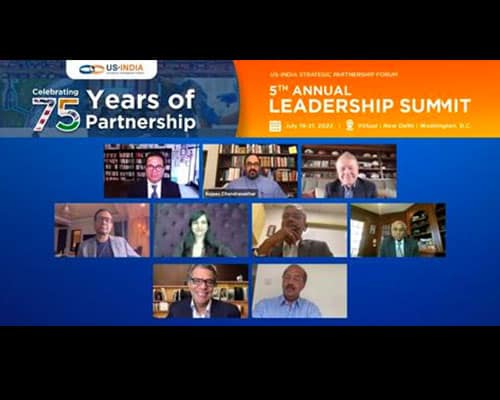
July 19,2022 | Virtual

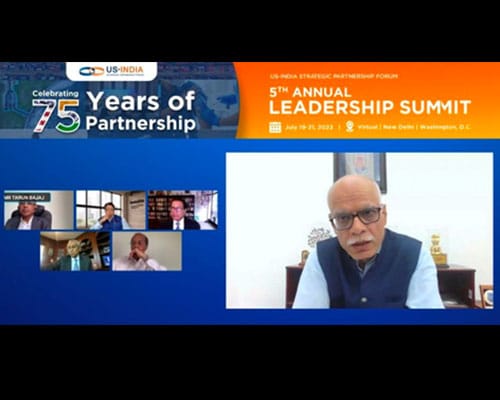
July 19,2022 | Virtual

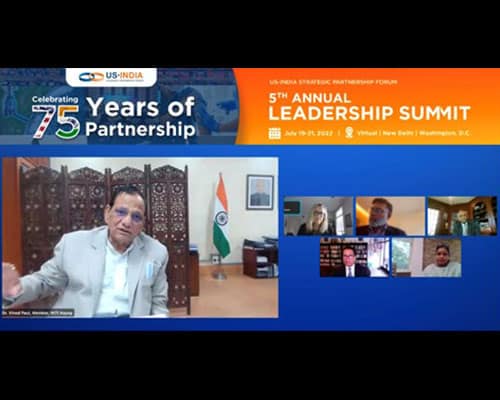
July 19,2022 | Virtual

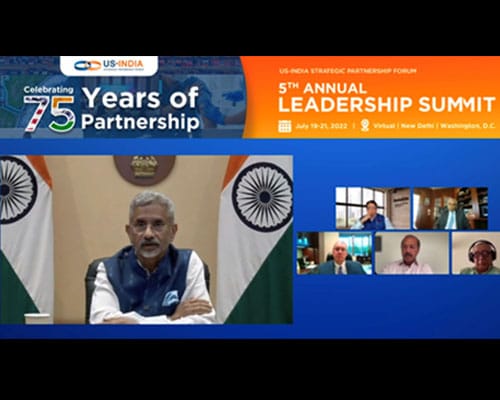
July 19, 2022 | Virtual
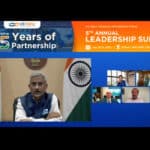

July 17,2022 | Virtual

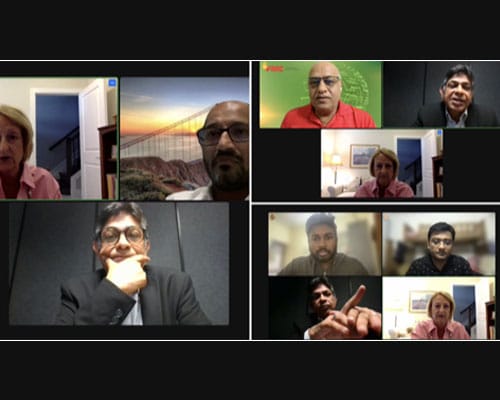
July 14,2022 | Virtual


July 14,2022 | Virtual
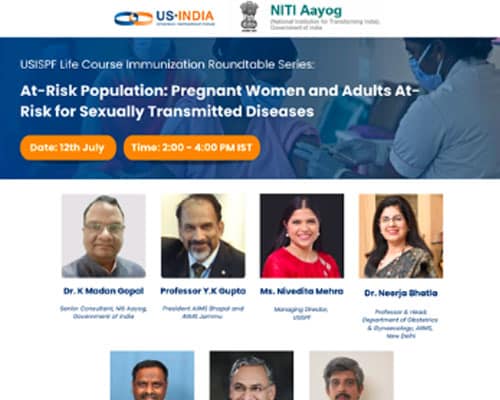
July 12,2022 | Virtual

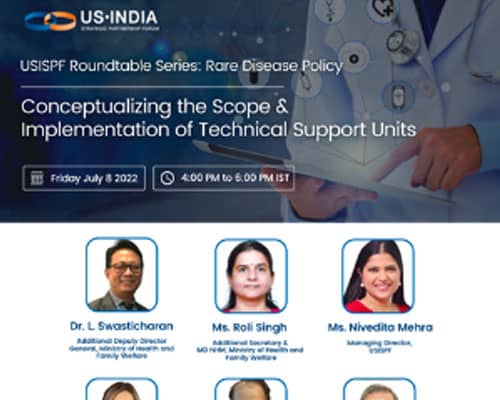
July 8, 2022 | Virtual

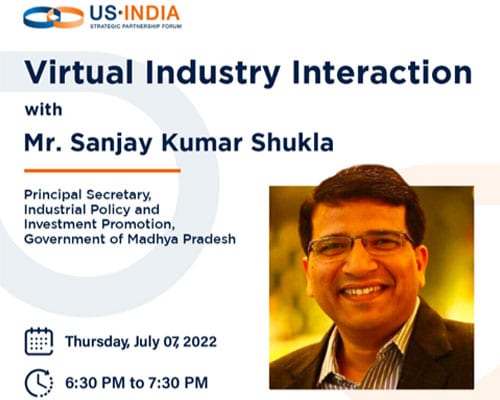
July 7, 2022 | Virtual


July 4,2022 | Virtual

March 16, 2021 | Virtual


The Quadrilateral Security Dialogue or Quad held its summit in a virtual format featuring for the first time, four heads of state – US President Biden, India’s Prime Minister Modi, Japanese Prime Minister Yoshihide Suga, and Australian Prime Minister Scott Morrison.
The four quad nations are the major players in the dynamic and high-growth Indo-Pacific region. While not a formal military alliance like NATO, the Quad framework is often regarded as a potential counterweight to growing Chinese influence. With the current health crisis, there is convergence on financing agreements to support an increase in manufacturing capacity for coronavirus vaccines in India. White House Press Secretary Jen Psaki noted that, “President Biden has made this one of his earliest multilateral engagements speaks to the importance we place on close cooperation with our allies and partners in the Indo-Pacific.”
A recently held discussion by the US-India Strategic Partnership Forum on the Quad’s immediate priorities featuring government and private sector leaders discussed a comprehensive cybersecurity response as a cornerstone of the quadrilateral framework. It is necessary to highlight the digital linkages of the region that contains little more than half of the world’s internet users, burgeoning ecommerce sectors, and hyperlocal service economies. The pandemic has also exposed vulnerabilities in global supply chains, with many countries exploring possibilities of reshoring and incentivizing local firms to manufacture closer to home.
Here are a few takeaways from the discussion focusing on the path to building coordination and cooperation in the highly digitized Indo-Pacific realm that is booming with diverse suppliers:
While discussants pointed out the need for a speedy adoption of 5G technology, it was also noted that 5G has emerged as a critical flashpoint in global geopolitics today. Despite 5G’s superior ability to support advanced technologies and critical infrastructures of countries, suppliers/vendors of 5G can potentially dominate a given country’s data economy.
India’s many technological advances from the last few decades which can be used for the betterment of the people. India and the US share an interest in the Indo-Pacific which is the most challenging regional area in geopolitics at the moment, presenting challenges to democracy.
India’s new cybersecurity strategy has an automatic intelligence sharing arrangement from Mumbai to California. Greater technology and intelligence sharing among Quad nations will allow for developing trusted supply chains, solar and wind energy development, and trusted sources for products and services. India’s concept of ORAN or Open RAN network is a great business opportunity for 5G solutions.
With the high intensity of cybersecurity attacks against nation states and individuals, the US-India technology partnership must be centered around the need to share data and further expand the collaboration among quad nations. The reason cybersecurity prevention is defensive rather than proactive is because it is far cheaper to attack than to defend. Moreover, the liability of a product in cybersecurity lies with the buyer not seller. Therefore, the need of the hour lies in creation of best practices around cybersecurity. The partnership between the two countries should be focused on sharing information in a transparent manner.
Capacity building in the cyber domain both on the products and services side by engaging the private sector and academia should be a key priority.
India is a mobile-first market, and to truly draw upon the benefits of the telecom network, will need to standardize 5G solutions to meet international industry standards, accelerate innovation, technology adoption, and build more robust security frameworks. Ultimately, deeper penetration of 5G and robust supply chain ecosystem can help India deliver quality and timely healthcare solutions to the remotest parts of the country.
Additional Readings:
The Digital Indo-Pacific: Regional Connectivity and Resilience

March 16, 2021 | Virtual


On March 10, USISPF and Nishith Desai Associates co-hosted a virtual webinar on decoding India’s recently formulated National Education Policy, entry of foreign universities, online learning regulations, degree accreditation process, and deepening US-India collaboration in higher education. Susan Ritchie, VP of trade and technology policy at the USISPF forum, introduced India’s new education policy and the opportunity it creates for U.S. educational interests. “We see India’s new education policy as strategically significant to our members as they plan to expand their workforce in India in the coming years. Collaboration between U.S. higher educational institutions and Indian academia is an important element to that goal,” Ritchie stated.
Experts from Nishith Desai Associates stressed upon increasing importance and reliance on technology in India and its relation to significant reforms in higher education. They presented an overview of the regulatory framework of higher education in India, distinguishing between both regulated and structured frameworks. They distinguished between the regulated framework as bachelors/undergrad, master’s, and diploma courses and structured framework that includes certification courses not leading to the award of a degree or diploma, vocational training, tutoring services, online education programs, and pathways/credit transfers. They explained how the structured framework is growing at an exponential pace by stating, “When there is lack of regulation, there is much faster growth in innovation and the way services are being delivered.”
Nishith Desai Associates further listed the different types of higher education institutes and how there is now a new set of recent regulations for technical regulations on online learning, which is important to monitor, especially during the COVID-19 pandemic. They discussed regulations for Foreign Educational Institutions, which include:
With that being said, NDA mentioned the opportunities found within the online educational sector, particularly with:
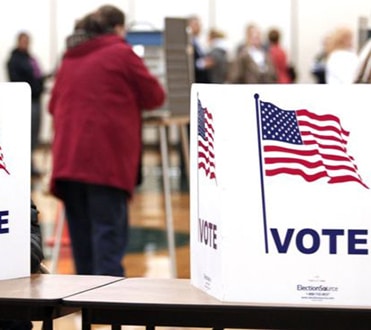
December 1, 2020 | Virtual
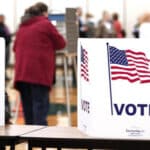

On November 5, USISPF and Squire Patton Boggs co-hosted a virtual event featuring Former US House Speaker John Boehner, Congressman Joe Crowley, Partner at Squire Patton Boggs, Frank Samolis and Senior Fellow at Council on Foreign Relations, Alyssa Ayres, moderated by Ambassador Frank Wisner. The discussion was focused on the ongoing US Election and its impact on US-India relations over the next four years. The speakers further addressed the current state of US-India trade and foreign policy, and shared their insights for the future.
Speaker John Boehner spoke on the increasingly critical relationship between India and the US, and the likely shift in tone and attitude towards India in a Biden administration. He also noted that, while Joe Biden may be declared President-elect, the Republicans may maintain control over the Senate. Another challenge for the new administration would be the deepening divide between the far left and the more moderate wing of the Democratic party.
Congressman Joe Crowley stressed on the historic significance of the greatest election turnout for an incumbent president in the history of the US and the importance of having a woman as Vice-President, that too of Indian descent. He presumed that this was sure to be matter of great pride for Indian Americans and will undoubtedly help strengthen the relationship between India and the US. On the issue of a divided Democratic Caucus, he recognized the role that Speaker Nancy Pelosi will have to play to unite the Congress.
Frank Samolis highlighted the emphasis that a Biden administration would place on collective action through participation in the World Trade Organization or through international trade agreements like the Trans Pacific Partnership. He acknowledged the uncertainty around whether the Biden administration will restore its benefits to India under the Generalized System of Preferences and eliminate tariffs on imports from India. However, he seemed hopeful that the election of Kamala Harris as Vice-President would allow for increased visibility of Indian Americans domestically and appeal to India as well.
Alyssa Ayres further mentioned that all administrations since President Bill Clinton’s had built upon an ongoing stable relationship with India. In the past, India had looked to the US to solidify its place in the United Nations Security Council, a matter of interest that may find greater support in a Biden administration. She also added that both Washington and India would seek a greater consensus on trade, especially as President Trump has often assumed a punitive approach to trade between the two countries. Ayres suggested that the Biden administration may choose to cooperate with India in the clean energy and climate space over the coming years.
An important topic of discussion was China. Ambassador Frank Wisner stressed upon the importance of the 2+2 defense agreement between India and the US, but recognized that both countries may be distracted by domestic politics and constrained by resources to collaboratively manage the rising tensions with China in the region. He recommended that India and the US take a “Divide and Deal” approach to avoid trade frictions from contaminating the overall geopolitical relationship between the nations. Congressman Joe Crowley also added that there needs to be an expansion of military ties and joint operations between India and the US against China.

December 1, 2020 | Virtual


On November 9, USISPF and Squire Patton Boggs co-hosted the second virtual event in the Post U.S. Election Briefing Series. The panel featured Former Foreign Secretary of India, Vijay Gokhale; Director of the Institute of South Asian Studies, C. Raja Mohan; Senior Director at BowerGroup Asia, Nydia Ngiow; Former US Secretary of Transportation, Rodney Slater; Associate Professor at National University of Singapore, James Crabtree; and Ambassador Frank Wisner as moderator. The discussion was focused on the after-math of the U.S. election, changes in the bilateral relationship between India and the US, and strategic and economic views from the Indo-Pacific.
Ambassador Frank Wisner mentioned that that the President-elect, Joe Biden, will move to reestablish key relationships with Europe, prepare a sterner response to China and Russia, and re-enter the US into the World Trade Organization, the Paris Agreement, and the Joint Comprehensive Plan of Action with Iran. He added that Biden would work with India to address the rising threat of China. Frank Samolis also agreed that President-elect Biden would adopt a more multilateral approach to foreign trade, but was uncertain whether trade issues would be addressed immediately. However, he was certain that Biden will work towards a more structured, strategic, economic dialogue with China. Rodney Slater added that relations between India and the Biden administration would be characterized by the willingness to be cooperative, and was hopeful for development in the aviation relationship between the two nations.
Foreign Secretary Vijay Gokhale provided key insights into the expectations of the government of India for the new administration. He asserted the importance of maritime strength to India, especially to counter China, and added that India would seek a reaffirmation of support from the Biden administration to the Quad as the Trump administration had. He reiterated that India will wish to work with the US for more humanitarian assistance, increased defense posture and spending, and deeper trade relationships. By signing the 2+2 defense agreement with Mike Pompeo just a few weeks ago, India has made it clear that it is ready to commit to a meaningful partnership with the US.
An important topic of discussion was the Quad. C Raja Mohan broadly defined the Quad as a response to the structural change that is taking place in the Indo-Pacific, as China continues to challenges US dominance in the post war order. He agreed that India is more likely to follow through with her commitment to allies in the region because of the circumstances that have arisen from tensions with China. He noted that much strategic progress could be made if the US were to support local nationalists to produce a regional balance in Afghanistan, the Korean Peninsula, and Taiwan.
James Crabtree acknowledged the need to produce a balance of power in Asia, which he believes will depend on the behaviour of China in the coming future. In other circumstances, he added, it would have been unlikely for the members of the Quad to cooperate in a period of such geopolitical tensions. India, as well as Southeast Asia, must work towards strengthening these emerging relationships.
Nydia Ngiow presented her perspective from Singapore. She stressed the importance of opportunistic relationships to give way for more strategic partnerships, and added that the Biden administration is expected to return to relationships of the pre-Trump era. She also mentioned that with Biden coming on board, there will be greater pressure on India to cave on issues of trade. Lastly, she added that multilateralism was sure to be prioritized in the Biden administration.
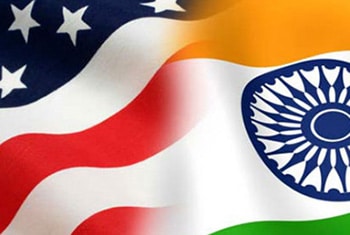
November 8, 2021 | Virtual
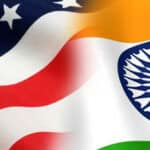

On July 29, USISPF and the United States Association of Former Members of Congress (FMC) co-hosted a virtual roundtable featuring Congressman Ami Bera, Congressman George Holding, and Becca Gould, Senior Vice President for Public Affairs at American Tower Corporation, moderated by Ambassador Miriam Sapiro. The discussion touched on many areas of opportunity for US-India trade relations, how to address outstanding challenges, and the importance of cooperation between the two countries in light of deteriorating relations with China and the ongoing COVID-19 pandemic.
Congressman Ami Bera spoke on the “endless” opportunities for the US and India to work together in the midst of the COVID-19 pandemic, pointing in particular to the opportunities presented by India’s pharmaceutical and vaccine development sectors. Another area of opportunity that he discussed was the potential for partnerships between US and Indian universities and research institutions. He also noted that, while a trade agreement has not yet been reached, it seems “one step away from completion” and the fact that the dialogue on a trade agreement has continued despite distractions from geopolitical and public health crises is optimistic.
Congressman George Holding highlighted the bilateral nature of support for the US-India relationship in the US, and the strides that the two countries have made in deepening their economic ties and defense cooperation. In terms of the future of this relationship, he noted that deteriorating relations between the US and China present an opportunity to deepen ties with India, and spoke to the potential for a deeper partnership in areas such as education and telemedicine as the experience of COVID-19 has led to a greater ability and willingness to work online.
Becca Gould highlighted the importance of ‘mini-deals’ between the US and India that aren’t as widely publicized as a potential trade agreement but are “ongoing daily” as a result of continued dialogue between the two countries, noting recent success in defense synergy, connectivity, and maintaining pharmaceutical exports.

November 8, 2020 | Virtual

On July 28, USISPF hosted a virtual roundtable on the current state of the Indian distressed market and related investment opportunities. Featured speakers included Ambassador Frank Wisner, International Affairs Advisor at Squire Patton Boggs; Sunil Mehta, former chairman of Punjab National Bank and currently, the non-executive chairman of Yes Bank; and Cyril Shroff, Managing Partner of Cyril Amarchand Mangaldas, as well as L Viswanathan and Dhananjay Kumar from Cyril Amarchand Mangaldas. Stephen Lerner, Global Chair of the Restructuring and Insolvency Practice Group at Squire Patton Boggs, moderated a panel discussion in which the speakers shared their insight on alternative mechanisms for insolvency and bankruptcy resolution, and opportunities these present for U.S. investors in India.
In his opening statements, Ambassador Wisner characterized distressed assets as “storehouses of great value and platforms for future growth,” and said that opportunities to restructure and refinance distressed assets in India could be a “fruitful endeavor” for U.S.-India cooperation.
Sunil Mehta discussed the improvements to India’s insolvency and bankruptcy policies since the creation of the Insolvency and Bankruptcy Code, 2016 (IBC) as well as some challenges that remain, particularly in light of the COVID-19 pandemic. He highlighted pre-packaged solutions, one-time restructuring, and asset reconstruction companies as potential resolution platforms that are being considered as alternatives to the IBC. Finally, he discussed the success of the bank-led resolution structure in the case of Yes Bank, which has been able to raise $2 million in capital through its public offering earlier this month.
Cyril Shroff also discussed the importance of the IBC, saying that the stressed assets environment has changed significantly as a result of having a rules-based system for resolution according to global best practices, and that its success has been supported by proactive legislative and executive action, as well as landmark judgements by the Supreme Court of India. While noting that the government’s decision to suspend the IBC in March was an appropriate policy response at that stage, he warned that the suspension may be abused by companies whose financial difficulties are not due to COVID- 19. Looking to the future, he predicts flexibility and open-mindedness on legislative reforms, new vehicles for private capital, meaningful action on pre-packaged regime, notification of a model code for cross-border insolvency, and a financial sector resolution code.

December 28, 2020 | Virtual

Post U.S. Election Briefing: Implications for Industry
On November 5, USISPF and Squire Patton Boggs co-hosted a virtual event featuring Former US House Speaker John Boehner, Congressman Joe Crowley, Partner at Squire Patton Boggs, Frank Samolis and Senior Fellow at Council on Foreign Relations, Alyssa Ayres, moderated by Ambassador Frank Wisner. The discussion was focused on the ongoing US Election and its impact on US-India relations over the next four years. The speakers further addressed the current state of US-India trade and foreign policy, and shared their insights for the future.
Speaker John Boehner spoke on the increasingly critical relationship between India and the US, and the likely shift in tone and attitude towards India in a Biden administration. He also noted that, while Joe Biden may be declared President-elect, the Republicans may maintain control over the Senate. Another challenge for the new administration would be the deepening divide between the far left and the more moderate wing of the Democratic party.
Congressman Joe Crowley stressed on the historic significance of the greatest election turnout for an incumbent president in the history of the US and the importance of having a woman as Vice-President, that too of Indian descent. He presumed that this was sure to be matter of great pride for Indian Americans and will undoubtedly help strengthen the relationship between India and the US. On the issue of a divided Democratic Caucus, he recognized the role that Speaker Nancy Pelosi will have to play to unite the Congress.
Frank Samolis highlighted the emphasis that a Biden administration would place on collective action through participation in the World Trade Organization or through international trade agreements like the Trans Pacific Partnership. He acknowledged the uncertainty around whether the Biden administration will restore its benefits to India under the Generalized System of Preferences and eliminate tariffs on imports from India. However, he seemed hopeful that the election of Kamala Harris as Vice-President would allow for increased visibility of Indian Americans domestically and appeal to India as well.
Alyssa Ayres further mentioned that all administrations since President Bill Clinton’s had built upon an ongoing stable relationship with India. In the past, India had looked to the US to solidify its place in the United Nations Security Council, a matter of interest that may find greater support in a Biden administration. She also added that both Washington and India would seek a greater consensus on trade, especially as President Trump has often assumed a punitive approach to trade between the two countries. Ayres suggested that the Biden administration may choose to cooperate with India in the clean energy and climate space over the coming years.
An important topic of discussion was China. Ambassador Frank Wisner stressed upon the importance of the 2+2 defense agreement between India and the US, but recognized that both countries may be distracted by domestic politics and constrained by resources to collaboratively manage the rising tensions with China in the region. He recommended that India and the US take a “Divide and Deal” approach to avoid trade frictions from contaminating the overall geopolitical relationship between the nations. Congressman Joe Crowley also added that there needs to be an expansion of military ties and joint operations between India and the US against China.

November 8, 2020 | Virtual

Nik Deogun, CEO of the Americas and U.S. Senior Partner at the Brunswick Group, moderated a panel on U.S.-India technology collaboration and innovation at India Incorporated’s ‘India Global Week’. The panel featured Shri Ravi Shankar Prasad, Minister for Communications, Electronics & IT and Law & Justice, Government of India, joined by Surya Kant, President, North America, UK and Europe, Tata Consultancy Services (TCS), as well as Rajen Vagadia, Vice President and President, Qualcomm India & SAARC.
The conversation highlighted India’s present initiatives in several significant areas of technological innovation, as well as the potential for industry members to support India’s growth in these. Minister Prasad highlighted the advances made to support India’s growing importance in the global digital supply chain, from ease of doing business measures to digitizing outdated business regulations. Mr. Deogun followed this with a question regarding 5G’s relevance to these advances, and the danger of India potentially ‘missing the bus’ on that front. In response, Minister Prasad quipped, “India is too big a country to miss any bus, and our technological background confirms that.” He went on to speak of the importance of 5G, as well as robust security apparatus to support 5G trials, being developed in partnership with IIT Madras. Mr. Vagadia detailed Qualcomm’s role in 5G, explaining that it had already arrived in India and the focus was now on identifying relevant applications for India through 5G Hackathons. Surya Kant spoke of how TCS was able to assist its clients return to a ‘business-as-usual’ model in the COVID period, and how its community first approach to job creation facilitated this success.
As part of India Incorporated’s ‘India Global Week’, USISPF Senior Vice President, Government Affairs & Policy, Nolty Theriot moderated a panel on U.S.-India energy collaboration. The webinar featured Mahmoud Jardeaneh, Energy Attaché at the U.S. Embassy in New Delhi, in conversation with Sujoy Ghosh, Vice President for APAC & India at First Solar; and Robert Fee, Vice President, International Affairs and Commercial Development, at Cheniere Energy.
The virtual conversation was an insight to the progress made in bilateral energy trade between the U.S. and India over the past few years. Mr. Jardeaneh called energy the centerpiece of the bilateral relationship, exemplified by the increases in oil, LNG, liquified gas, and other exports. Panelists acknowledged the impact of COVID on the growth of cooperation. However, Mr. Fee also highlighted how COVID had shown the resiliency of natural gas and LNG thanks to long-term contracts and a portfolio approach. Mr. Ghosh also appreciated how the current period had created an economic case for moving to renewable energy. This is a goal outlined by U.S.-India Gas Task Force as well, focused on supporting innovative solutions in India’s transition to natural gas.
USISPF President and CEO, Dr. Mukesh Aghi moderated a conversation between Ambassador Taranjit Singh Sandhu, Ambassador of India to the United States, and Ambassador Kenneth I. Juster, U.S. Ambassador to India, discussing the history, current relevance, and potential growth of the U.S.-India partnership in the current period. This conversation was conducted as part of India Incorporated’s ‘India Global Week’.
The Ambassadors both spoke warmly of the shared values of democracy, social justice, as well as the large people-to-people connect that formed the bedrock of the U.S.-India relationship. They also spoke favorably of the prospect of a free trade deal between the two nations to solidify the trade relationship, already growing at 10% each year, and create mutually favorable trade opportunities in defense, investments, and even healthcare. Particularly in the COVID period, both Ambassadors highlighted the importance of India-U.S. partnership in medical research and production. Finally, the energy sector was identified as the component of the trade basket with a lot of potential moving forward, and an area where both sides would see a win-win situation through collaboration.
An insightful discussion on U.S.-India defense partnerships was moderated by Vikram J. Singh, USISPF Senior Advisor for Defense & Aerospace, and featured Dr. Joe Felter, William J. Perry Fellow at the Center for International Security and Cooperation and Research Fellow, Hoover Institution; William Blair, Vice President and Chief Executive at Lockheed Martin India; Salil Gupte, President of Boeing India; N Raveeswaran, Head of Strategic Business Partnerships, Aerospace & Defense, at Mahindra Defense; and strategic and foreign policy analyst Dr. Harinder Sekhon.
Mr. Blair and Mr. Gupte highlighted major ongoing programs by Lockheed Martin and Boeing respectively in collaboration with the Indian government and other private players as examples of the current defense partnership and its potential for growth. Panelists also spoke of opportunities for the U.S. and India to collaborate in defense and aerospace raw materials, for which they recommended a government-to-government and consortium approach. Dr. Sekhon discussed the importance of defense in the current political climate, and the pertinence of information sharing through systematic security classifications on either side for ease of access. This underscored Mr. Felter’s pertinent final point, that the greatest strength to this defense relationship would be trust, which both sides could shore up by putting ‘meat on the bones’ of information and technology sharing initiatives. The panel offered a peek into the future and strategy of the U.S.-India defense relationship, as well as the pertinent role played by the arms and aerospace industry in facilitating growth. While strategic partnerships were concluded as an important path to take this relationship further, panelists emphasized the importance of mutual trust in creating the most mutually beneficial policies.
Anil Advani, Managing Partner at Inventus Law, moderated a panel hosted by India Incorporated as part of their ‘India Global Week’ on enabling start-ups in the U.S.-India corridor. The webinar featured Umesh Sachdev, Co-founder & CEO of Uniphore; Bipul Sinha, Co-founder & CEO of Rubrik; and Praveen Akkiraju, Board Advisor at Team8.
Panelists discussed the state of play in the U.S.-India tech corridor. Bipul Sinha highlighted the transition of India from a technology and production hub, to a major producer of entrepreneurs today leading to the proliferation of Indian-owned business ventures. Praveen Akkiraju also commended the rapid digitization of Indian infrastructure, speaking highly of the sophistication of the Indian market in adapting to new technologies as well. He spoke of healthcare tech and unconventional ventures outside traditional business-to-business or business-to-consumer areas as major investment opportunities in the future. The panelists also highlighted the potential of the dynamic US-India startup corridor to create well-paying jobs in the both countries- a win-win opportunity for both economies.
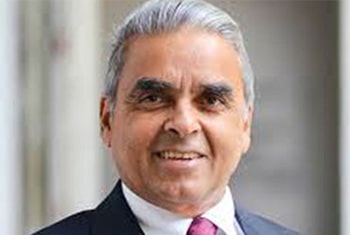
November 8, 2020 | Virtual

On July 7, Kishore Mahbubani and Ambassador Tim Roemer joined USISPF members on a webinar to discuss the insights shared in Mahbubani’s new book, Has China Won?, which was released on March 31, 2020. Mahbubani is the former Singaporean Permanent Representative to the United Nations and current Distinguished Fellow at the Asia Research Institute, while Ambassador Tim Roemer is the former U.S. Ambassador to India and, currently, Executive Director and Senior Counselor at APCO Worldwide, as well as a member of the USISPF Board of Directors. Both speakers brought extensive experience and expertise to their discussion of the “contest” between the U.S. and China, and the impact of this contest on India’s relationship with both countries.
Some of the key takeaways of the discussion – and Mahbubani’s book – were the need for a “comprehensive, thoughtful, and long-term strategy” in the U.S.’s approach to China and for the two countries to balance competition with cooperation. Mahbubani also points to China’s strategic mistake in alienating the U.S. business community through forced technology transfers and intellectual property violations. In terms of how tense relations between the two countries impact their respective relations with other countries in the Indo-Pacific region, including India and the ASEAN bloc, Mahbubani highlighted that no country wants to be forced to choose between the U.S. and China, but there is a “huge reservoir” of goodwill to the U.S., particularly in ASEAN, which the U.S. can cultivate through a nuanced diplomatic approach.
Speaking on India, Mahbubani described India as occupying a “geopolitical sweet spot” as the “most courted” country in the world, with many opportunities. In terms of U.S.-India relations, he highlighted the benefit to the U.S. of having “a close, trusted relationship with an independent India,” and pointed to the number of influential Indian-born leaders in the U.S. business community.

November 8, 2020 | Virtual

On June 23, USISPF hosted a virtual briefing with Congressman Ami Bera on the challenges faced by U.S. biopharmaceutical and health care companies in India, as well as opportunities for collaboration between U.S. and India in these sectors. Many USISPF member companies who are leaders in the pharmaceutical, medical device, and health care sectors participated in the discussion.
In his opening statements, Rep. Bera highlighted the need for countries to work together rather than turn to protectionism in the face of COVID-19 and the global economic downturn. He also pointed to the current situation as an opportunity for the U.S. to deepen its relationship with India, both through investments as the U.S. – alongside many other countries – seeks to diversify its supply chain in light of the COVID-19 pandemic’s disruptions to existing supply chains and critical infrastructure, and through collaboration on a COVID-19 vaccine and research.
The key issues raised by USISPF member companies regarding the challenges they face in India include barriers to market entry, weak intellectual property (IP) protections, and product pricing controls. Kate Beale, Associate Vice President of PhRMA, who moderated the discussion, also identified the bilateral trade dynamic, pro-innovation policy, and the broader health care access discussion as priorities for the U.S.-India relationship in the pharmaceutical sector. Participants also highlighted opportunities for the two countries to deepen ties through research collaboration and vaccine development.
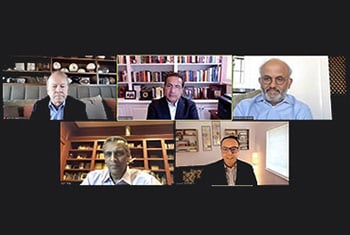
November 8, 2020 |Virtual
The US-India Strategic Partnership Forum kicked off its “Startup Connect Program” at its virtually held West Coast Summit. Focused on strengthening US-India bilateral ties through startups, the summit brought together over 300 executives including 100 startups, 100 Fortune 500 companies, and senior officials from both governments.
Speakers at the launch included: Ambassador Taranjit Singh Sandhu, Ambassador of India to the United States; Keith Krach, Under Secretary of State for Economic Growth, Energy, and the Environment, U.S. Department of State; John Chambers, Founder and CEO, JC2 Ventures & Chairman of USISPF; Shantanu Narayen, Chairman, President, and CEO, Adobe; Raj Subramaniam, President & COO, FedEx Corporation; and several startup founders.
Read our press release here.
In a virtual ‘fireside chat’ with John Chambers, Ambassador Taranjit Sandhu, the Ambassador of India to the U.S., highlighted the importance of technology to both countries’ ability to respond and adapt to the COVID-19 pandemic. He pointed to U.S.-India’s long-standing partnership in critical sectors, such as health care, life sciences, and technology, as critical to addressing current challenges, and categorized young innovators and their startups as a key driver of economic growth that will continue to bring the countries together. Finally, he outlined his priorities as the Indian ambassador to the U.S., including addressing U.S. visa issues, deepening trade relations, and attracting investment on both sides. He also expressed his optimism about the possibility of finalizing a smaller trade agreement in the near future.
In conversation with John Chambers, Keith Krach, the Under Secretary of State for Economic Growth, Energy, and the Environment at the U.S. Department of State, outlined his three priorities as economic security, economic competitiveness, and building an Economic Prosperity Network of trusted partners. He pointed to India as an important partner in achieving these goals and highlighted the importance of cooperation between the U.S. and India in safeguarding intellectual property and global economic security, particularly in light of the challenges presented by China.
In a discussion moderated by Uniphore Founder and CEO Umesh Sachdev, Shantanu Narayen, the Chairman, President, and CEO of Adobe, and Raj Subramaniam, the President and COO of FedEx Corporation, shared their insight as business leaders into the opportunities and challenges presented by the COVID-19 pandemic, to startups and large corporations alike. They both emphasized the importance of approaching the current crisis as an opportunity for innovation, and highlighted technology, digitization, and data as key assets for companies to adapt to the “new normal.” Another point emphasized by both leaders is the importance of corporate culture.
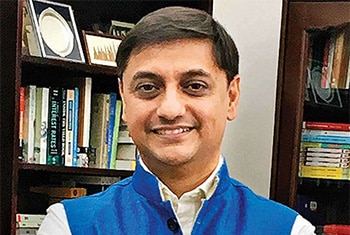
November 8, 2020| Virtual

On April 29, Sunjeev Sanyal, principal economic advisor to the Government of India’s Ministry of Finance, briefed USISPF members on the state of the Indian economy and what is in store as the country reopens from its COVID-19 lockdown.
In a discussion moderated by Kaku Nakhate, President and Country Head, India, for Bank of America, Sanyal highlighted that India – and the rest of the world – should not imagine that economic recovery will mean a return to the pre-coronavirus world, but a ‘fundamental reset.’ He also said that India will play an active role in this post-coronavirus round of ‘rule-setting,’ pointing to the recent G20 endorsement of an action plan formed by the framework working group co-chaired by India and the UK. On the possibility of India playing a larger role in the restructuring of global supply chains, he said that the country has to be flexible and work with industry and partners as the situation continues to evolve.
In terms of the Government of India’s policy response to the economic impacts of COVID-19, he characterized this approach as having three steps. The initial step was to cushion the economic impact of COVID-19 through efforts such as the stimulus package targeting India’s most vulnerable citizens and pushing back financial deadlines. It is now shifting into the ‘opening up’ stage, as the staggered relaxation of India’s lockdown has allowed many areas to resume manufacturing and the movement of goods. At some point, the approach will ramp up for the ‘rebuild’ stage. Sanyal also noted that India has been successful in not expending its resources too quickly, giving it the monetary and fiscal space needed to respond as recovery efforts continue.
In a Q&A session with USISPF members, Sanyal provided updates on and insight into topics such as India’s new FDI rules, the current low oil prices, India’s fiscal deficit post COVID-19, and calls for increased spending on medical infrastructure, which he warned must include funding for public health and sanitation as well as hospitals. When asked on what economic reforms India should prioritize as it reopens, Sanyal noted that it depends on feedback from companies, but a lot of action will have to happen at the state, rather than the federal, level— pointing to Uttar Pradesh as a state which has already risen to the occasion.

November 7, 2020 | Virtual

On April 16, Sanjay Chadha, Additional Secretary of the Ministry of Commerce and Industry, joined USISPF members on a webinar to provide updates on the Ministry of Commerce & Industry’s response to the ongoing COVID-19 pandemic. In discussion with USISPF CEO & President Dr. Mukesh Aghi, Secretary Chadha provided insight into the Government of India’s next steps, and highlighted opportunities for the U.S. and India to deepen their economic partnership in the future.
Secretary Chadha stated that the government of India has two priorities right now, to contain the coronavirus and to address the impact of COVID-19 on the economy. He spoke optimistically about the future of U.S.-India trade, highlighting U.S. companies as playing an important role in reopening India’s economy after the lockdown is lifted. He advised USISPF member companies on procedures for seeking assistance on logistic and operational issues as a result of the national lockdown and, noting that Ministry of Home Affairs (MHA) guidelines are interpreted on a state-by-state basis, reiterated the importance of communicating with local authorities.